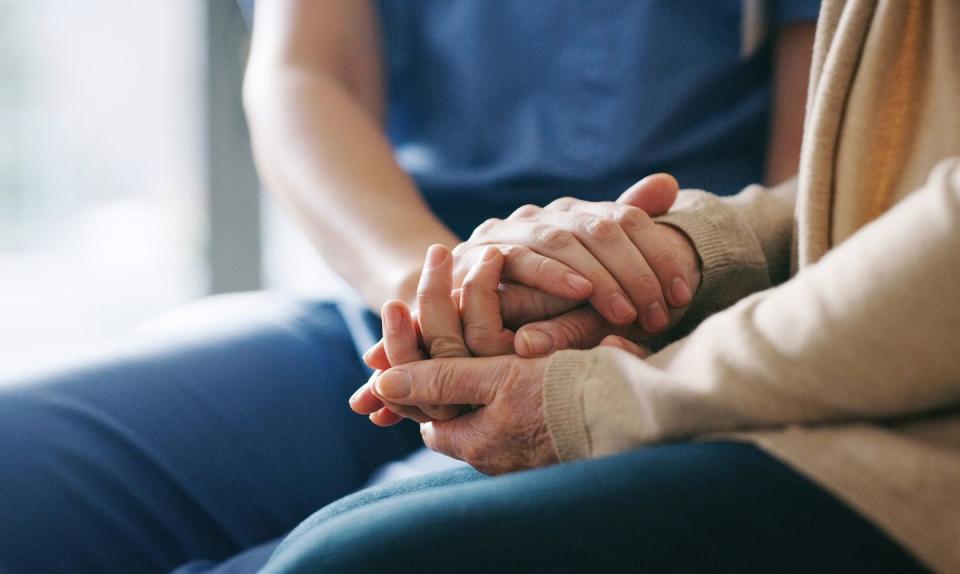Mental health: Where are we now? Learn more about our new Red Magazine campaign

We live in a world that is far more open about mental health than ever before. We’re encouraged to talk about our feelings more, and prioritise self-care – whether that’s taking a yoga class, or practising mindfulness – and we know that seeking therapy or extra help is progressive, not shameful. According to Julie Cameron, an associate director at the Mental Health Foundation charity, research suggests we’ve taken strides forward in how open and understanding people are about mild to moderate mental health conditions (such as anxiety and depression).
She cites a recent Scottish study in which 79% of respondents said they would have the confidence to talk about their own mental health today, but only 23% would have said the same 20 years ago. Yet while many workplaces now have mental health first aiders, and the Department of Health has recognised mental health as a key concern, Cameron says we still have some way to go before we can say the taboo is behind us. "It’s great that we’ve moved a lever in terms of people being more open about having anxiety or accessing therapy, but the stigma for long-term and enduring mental health conditions doesn’t seem to have moved on at all," she says.
Cameron mentions a piece of Scottish research, which surveyed those with complex and enduring long-term mental health conditions, such as personality disorders, schizophrenia and bipolar disorder. The study found that 75% of respondents had not revealed the severity of their mental illness to healthcare professionals and 93% had stopped themselves getting close to people, to avoid rejection. Evidently, for those among us who struggle with severe mental health conditions, the world still doesn’t feel like such an accepting, welcoming place. But why?

"Longer-term conditions are messy; this is people dealing with really tough stuff," says Cameron. "Often the world can seem to favour a view of mental health in which people are well or make a full recovery." Indeed, the language we use surrounding mental health is still lagging behind. We’ll say we have Post-Traumatic Stress Disorder (PTSD) from minor inconveniences, or Obsessive Compulsive Disorder (OCD) because we like a tidy house. In many cases, we don’t recognise how serious and life-altering these conditions can be. Or perhaps we make light of them because they’re so tricky to confront. We’re often told we should think of mental health in the same way we think of physical health – that suffering from depression is the same as having a broken arm.
But this comparison actually minimises the nuance of mental health, not least because the solution isn’t as simple as using a brace or having surgery. "Treating complex mental health issues requires a multi-pronged approach, and frequently stems from a range of challenging circumstances," says Cameron. "You’re twice as likely to be diagnosed if you live in an area of deprivation, while childhood trauma has a huge impact on developing a long-term and enduring mental health problem. And if someone is lonely, the likelihood of recovering is much less."
According to the Mental Health Foundation, one in four adults will experience a mental health problem of some kind each year in England – which, says Cameron, has remained consistent for several years. She points out that more young people are asking for help than ever before – in 2021, a record 210,000 students sought help for their mental health. In addition to this, many mental health services have reported that people are coming in with more severe, complex issues than previously seen.

"During the pandemic, people were reluctant to access the NHS for physical healthcare unless it was a real emergency, so people have been diagnosed with health conditions at a later stage," says Cameron. "We imagine the same applied to those with mental health issues, too." It was estimated last summer that the number of people waiting for community mental health care had risen to 1.2m. No doubt, this has contributed to the latest devastating suicide figures. In 2021, the number of suicides recorded in England and Wales increased by 6.9% from 2020.
So, where do we go from here? In practical terms, Cameron believes we need a more joined-up approach to healthcare, which views mental and physical health, as well as social care, as part of the same continuum. "It’s not just about providing services at the point of need, but also about networks and community services that help people live well and prevent poor mental health in the first place," Cameron says. But physical, practical support for those who struggle is only one part of the equation when it comes to busting the stigma surrounding mental health.
We can all contribute to the changing tide by opening up more about the messier, more delicate parts of mental health, rather than keeping them hidden in the shadows. Like how it feels to fall in love while you have borderline personality disorder. Or what it’s like to experience psychosis. Or acknowledging what OCD really means. Every time we admit, learn about and empathise with these challenging conversations, we can dismantle the stigma, piece by piece. Which is why we are initiating a year-long series dedicated to lifting the lid on complex mental health conditions, in partnership with the Mental Health Foundation.
Each month, we will share a personal story, or advice from experts, to shine a light on what it’s really like living with, and loving people with, complex mental health conditions. After all, this isn’t just a tiny proportion of the population – all our lives have been, or will be, touched by mental ill-health at some point. To kick off our series, we wanted to go back to basics: how to access support when you need it most.
When you are feeling down...
If you’re struggling with your mental health, it’s likely that the usual happiness hacks aren’t going to cut it. Here’s how to go about accessing support, for yourself or a loved one. We’re often told "it’s okay not to be okay", and, says Julie Cameron, "It’s important to recognise the ups and downs of the human existence." But how do you know when what you’re feeling is more than just everyday stress, or a natural response to chaotic circumstances, and does, in fact, require medical assistance? There isn’t one single way to know, but clinical psychologist Dr Annie Hickox has a general rule of thumb: "When feeling down becomes persistent and starts to disrupt day-to-day life, that’s when you should think about getting support."
According to Dr Hickox, the phrase "I’m not up to it" is pervasive in mental illness, although it manifests in different ways. You might think "I can’t be bothered" or that you are a burden to others. If your normal day-to-day activities are disrupted in any way – whether that’s struggling to sleep, changing your eating habits, or you’ve stopped doing things you enjoy – this could suggest an underlying problem. Undoubtedly, mental health is incredibly complex. "It’s so different for every individual," says Cameron. While certain symptoms might alert you to the realisation that something is wrong, the only way to determine for sure is to reach out.
Confide in a loved one
"I’d hope that everyone has someone they can say 'I am feeling rubbish' to," advises Cameron. "Try saying it aloud to someone else and see where it leaves you. Perhaps you just need an outlet to talk every now and again – it can make a big difference just being supported by someone else." But, says Cameron, if you don’t think it’s helping, or you don’t have that person, the next step would be to talk to a doctor.

See your GP
Many people still think of GPs as physical health specialists – but up to 40% of GP appointments concern mental health. Your GP should have an awareness of all the potential treatments that might help you if you need support, clinical and otherwise. They might not treat you immediately, instead asking you to monitor your symptoms before coming back; this is called "watchful waiting" where they want to see if how you’re feeling changes.
"For example, they might be able to identify that it’s not clinical depression, but that you’re lonely," says Cameron. "They can help you connect to social clubs in your community. There are non-clinical treatments that can benefit you." It is wholly possible, however, that you could require clinical attention; GPs can not only prescribe anti-depressant or anti-anxiety medication to treat symptoms, but can refer you to talking therapies and specialist help.

Seek specialist services
The primary referral path for talking therapies in the NHS is via Improving Access to Psychological Therapies (IAPT). Your GP can refer you to your local IAPT services, but you can also refer yourself through the Find an NHS psychological therapies service (IAPT) portal online, which pinpoints local services in relation to the GP with whom you’re registered. IAPT services usually offer cognitive behavioural therapy (CBT), counselling and other forms of guided self-help. They can treat a range of mental health conditions from depression and anxiety to more complex disorders such as PTSD and body dysmorphia. For more specialist support, your GP can refer you to the community mental health team. They are a multi-disciplinary group of psychiatrists, psychologists, mental health nurses and social workers in your area with experience of treating complex mental health conditions. They can refer you for assessment and diagnosis, or inpatient services for monitoring and treatment.
Struggling to navigate the system?
When dealing with NHS services, the assumption is that you get what you’re given. This doesn’t have to be the case. You have the right to request access to certain services. For example, if you feel you have a complex mental health disorder and that you would benefit from a diagnosis, you can ask to see a psychiatrist. "Right to choose" is a legal right to choose a service or hospital you’d like your GP to send you to, should they need to refer you. You should be given a choice of services or hospitals available to you. This can include private hospitals that are qualified to provide NHS services.
Though it is true that GPs are often viewed as the gateway to accessing mental health services, if you feel your GP isn’t listening to you, you’re within your rights to see a different GP in order to get a second opinion. It’s also possible to change your GP surgery if you feel your current practice isn’t taking you seriously, so long as other local practices aren’t at full capacity. You can also request appointments with specific GPs within your practice or ask to speak to a female GP if it makes you feel more comfortable. If you feel intimidated by doctors and professionals, another option is seeking out an advocate. An advocate’s role is to listen to your point of view and help you put it forward in order to get the services you need. They can attend appointments with you or help you write letters. There are charities across the UK with trained advocates who can help you understand your options, but even a supportive relative can fill the role and help you in this way.
Utilise charity and third-party support

You don’t need to be suicidal in order to ring the Samaritans. You can contact them in relation to any emotional stresses. Call on 116 123 or visit samaritans.org. Rethink offers a range of services, with local support groups all over the UK and an informative advice line to help you understand your rights when navigating support. It also has a directory of advocacy services. Visit rethink.org. Mind has branches across the UK that offer advice and support to those seeking mental health help. Visit mind.org.uk.
For more tips and advice from the Mental Health Foundation, go to mentalhealth.org.uk
You Might Also Like



